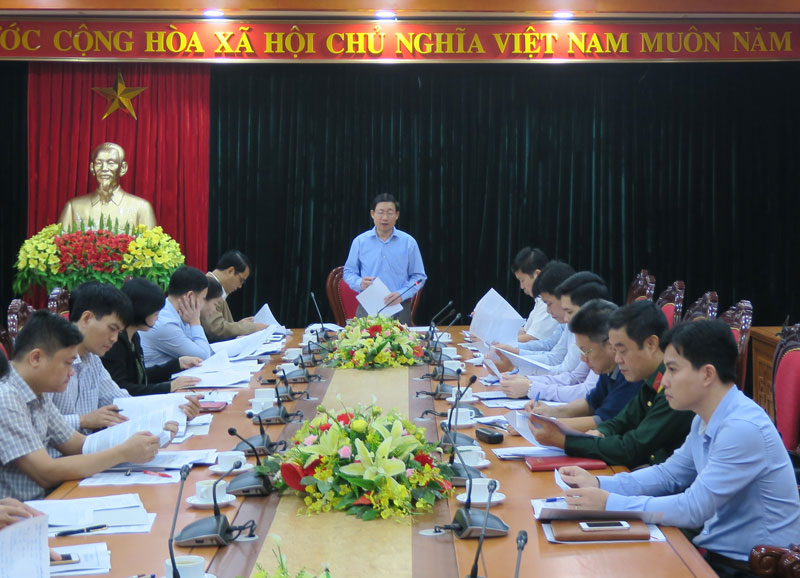
(HBO) - On 7 November, the Provincial Steering Committee of 1084 held a meeting to discuss and evaluate the results of the implementation and arrangement of villages, hamlets and residential areas in the province.
 Mr. Bui Van Cuu, the Vice Chairman of the Provincial
People's Committee, the Head of the Steering Committee of 1084 is making a
speech at the conference.
Mr. Bui Van Cuu, the Vice Chairman of the Provincial
People's Committee, the Head of the Steering Committee of 1084 is making a
speech at the conference.
At the period of June 2017, there were 2,058 villages,
hamlets and residential areas in the province, of which 66% of villages had a
size of less than 100 households; 90% of the residential areas have a size of
less than 150 households ... Looking into the central guidelines and the
practical activities at the grassroots level, the province has issued a policy
on "The pilot merger and consolidation of the communes, helmets and residential
areas in Hoa Binh province”.
Accordingly, in June 2017, the provincial People's
Committee issued the Decision No. 1084 on the promulgation of the Project "The
pilot merger and consolidation of the communes, helmets and residential areas
in Hoa Binh province”. After 1 year of pilot, assessing and drawing experience,
in September 2018, the Provincial People's Committee issued the Decision No.
124 / KH-UBND on the implementation, arrangement of villages, helmets and
residential areas throughout the province.
There were a lot of difficulties and inadequacies during the
process of deployment and implementation, but with high political determination
and the consent of the majority of voters and people, the arrangement of
villages, hamlets and residential areas in the province was successful. Up to
now, there have been 1,482 villages, hamlets and residential areas in the whole
province, decreasing 576 villages, hamlets and residential areas compared to
the time before June 2017.
Along with the arrangement of villages, hamlets and
residential areas, the province has also timely guided the arrangement and
consolidation of the organizational apparatus in the hamlets, villages and
residential areas. Accordingly, there have been a reduction of about 2,300
part-time people working in villages and hamlets.
It has also reduced 2,880
mass organizations at the village and helmet level, saving about 51.7 billion
dongs from the budget every year, which is spent on allowances for
non-specialized employers and funding to support the activities for mass
organizations in villages, hamlets and residential areas.
The Standing Board of the Hoa Binh provincial Party Committee has agreed in principle on a proposal by the Standing Board of the Party Committee of Hoa Binh city to gather feedback on the city’s 1:2000 zoning plan, which forms part of its broader urban development strategy.
Hoa Binh province has made notable progress in public administration reform and digital government development, with the satisfaction index among citizens and businesses reaching over 84%, according to recent government evaluations.
Thanks to great efforts by local authorities in recent times, the governance and public administration performance of Mai Chau district has been significantly improved.
In the afternoon of June 6, the Party Committee, the People's Council, the People's Committee and the Fatherland Front of Lac Son district solemnly held a meeting to celebrate the 139th anniversary of the district's founding (1886–2025) and the 79th anniversary of the establishment of the district's Party Committee (1946–2025). There was the attendance of Mr. Bui Van Thang, the Vice Chairman of the Provincial People's Council; Mr. Quach Tat Liem, the Vice Chairman of the Provincial People's Committee; Ms. Dang Bich Ngoc, the Deputy Head of the National Assembly Delegation of the province; as well as the former leaders of the province and district through various periods, who are the natives of the district.
Implementing the Politburo’s Resolution No. 57-NQ/TW on breakthroughs in science – technology, innovation, and digital transformation is a golden opportunity for the northern mountainous province of Hoa Binh to renew growth model, improve competitive edge and shorten digital gap.
Resolution 57-NQ/TW, issued by the Politburo on December 22, 2024, identifies sci-tech, innovation, and digital transformation as strategic breakthroughs to build a developed and prosperous nation. In Hoa Binh province, this spirit is not just a slogan, it’s being put into action through concrete initiatives that form a "new development triangle”: digital citizenship, digital economy, and digital administration.



 Mr. Bui Van Cuu, the Vice Chairman of the Provincial
People's Committee, the Head of the Steering Committee of 1084 is making a
speech at the conference.
Mr. Bui Van Cuu, the Vice Chairman of the Provincial
People's Committee, the Head of the Steering Committee of 1084 is making a
speech at the conference.